Whittier, Behind Stalwart Defense, Beats CMS 5-3 to win Inaugural DIII Collegiate Water Polo National Championship Title
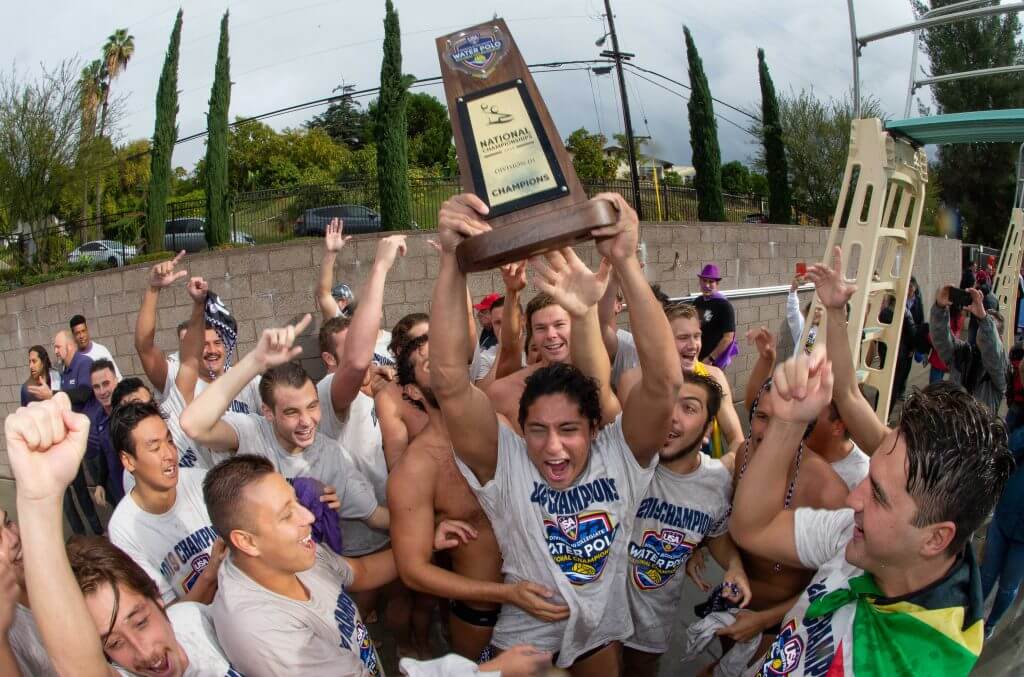
WHITTIER, CA. In a match unlike any other they had played previously this season, for four quarters the Poets of Whittier and the Stags of Claremont-Mudd-Scripps slogged through the final of the inaugural DIII Collegiate Men’s Water Polo National Championship on Sunday at the Lillian Slade Aquatic Center. Both delivered season-lows in goals scored with the difference being that the Stags’ total — three — was two less than the Poets, which is why Whittier won.
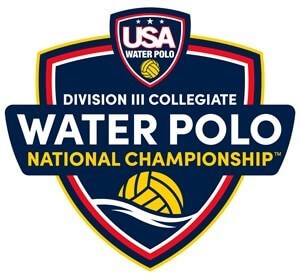
In the press conference after the match — with Whittier co-captains Dominick Nevarez and Hans Zdolsek admiring the trophy as the country’s top Division III team, Poet Head Coach David Kasa reflected on his team’s journey this season. It’s a path that saw a roster from all over the world assemble in August for a season which saw titles in Southern California Intercollegiate Athletic Conference (SCIAC) regular season and tournament play. One that was capped with the first-ever winner of a national collegiate tournament specifically for DIII schools.
“When the game finished, to see the guys so excited, jumping in the pool…. a lot of work went into this,” Kasa said. “It was our long-term goal all season. To work hard and accomplish a goal is a really beautiful thing.”
In defeat, CMS head coach Greg Lonzo gave credit to his opponent and a stifling defensive effort that shut down the Stags — held to a season-low in goals — unlike any other opponent had.
“Kuddos to Whittier. They did an incredible job on defense, storming out, moving at us quite a bit — giving us different looks that we weren’t able to adjust to.”
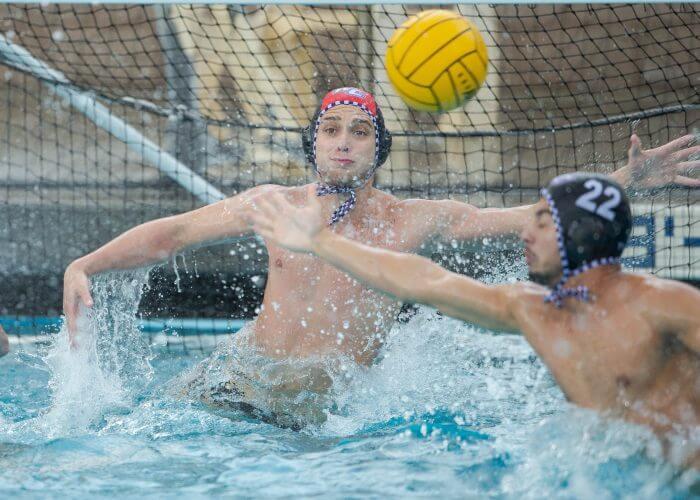
Whittier goalie Murat Ersoz and Dominick Nevarez. Photo Courtesy: Tony Leon
The result of an unprecedented collaboration between USA Water Polo, the national governing body for the sport in America, the Collegiate Water Polo Association, synonymous with varsity and club polo outside of California, and the SCIAC, the DIII Collegiate Water Polo National Championship featured four team — two from the East and two from the West, playing semifinal and finals matches over two days at the home of the SCIAC champion, which this year was Whittier.
[In Festive Opening to First-Ever DIII National Championship, Whittier and CMS Advance to Finals]
In semifinal action Saturday, the East was dispatched by the West; Whittier beat MIT 12-8, while CMS took care of Johns Hopkins by a score of 14-11. This set up a rematch of the SCIAC final two weeks earlier, a back-and-forth affair in which no team led by more than a couple of goals that resulted in a 13-12 win for the Poets.
A fast start leads to a slow finish
After an opening period that saw the visiting Stags (18-12) take an early 2-1 lead, the Poets (21-12) roared back with four goals in a six-minute span of the second to jump out to a 5-2 lead at halftime. And that was what the same score a period and a half later, until CMS, which had gone more than 20 minutes without scoring, finally broke through on a goal by Will Clark forty seconds into the final period. It turned out to be too little, too late, as Whittier goalie Murat Ersoz — with numerous difficult stops included in his 15 saves to earn tournament MVP honors — helped the Poets hold on for a 5-3 win.
Whittier opened the scoring on a goal from Micah Kamai on his team’s first possession, At the five and a half minute mark, CMS’s Koss Klobucher got the equalizer. Less than two minutes later, CJ Box scored to give the Stags their only lead of the match.
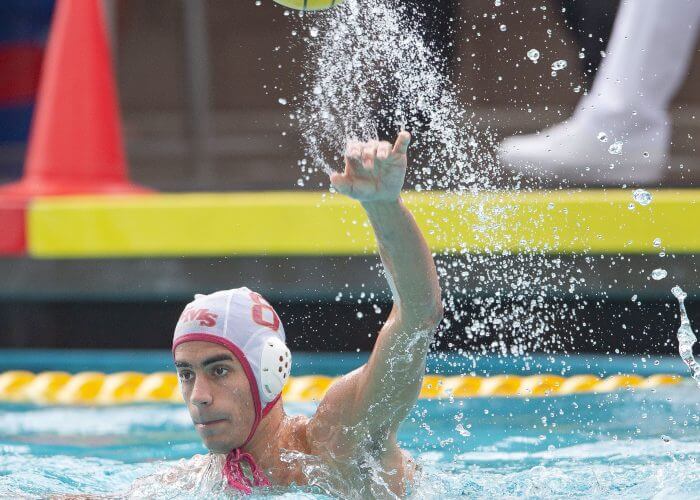
Will Clark of CMS. Photo Courtesy: Tony Leon
One circumstance that Lonzo had identified as key was: whoever went on a scoring spree was likely to control the game. That’s exactly what happened for Whittier in the second period. With their front-line players in the match, the Poets reeled off two goals in two minutes, part of a 4-0 scoring spurt in the second. First Nevarez, who led the Poets this season in goals with 66, scored 25 seconds into the second period with his team enjoying the man advantage.
Two minutes later, lefty Maxwell Murphy also converted with his team on the power play to give Whittier a 4-2 lead. When Eric Borunda and Carlos Heredia Viteri scored within a minute of each other late in the period, the Poets had all the goals they would need. And all they would score for the rest of the game.
No one told the Stags that scoring was over
Viteri goal was all the scoring until Clark’s goal in the fourth period. The Poets went scoreless for the match’s last 17 minutes; that their defense held up — brilliantly backstopped by Ersoz — is the story of a game unlike the other three meetings this season between the two teams. In those contests, the lowest scoring affair was a 10-9 win by the Stags on November 6 — the only time all season that the Poets dropped a game to a DIII opponent.
[First-Ever DIII Collegiate National Men’s Water Polo Championship Opens Saturday at Whittier]
CMS also had a winning record against DIII teams. The Stags lost six times against smaller schools, but two of those losses were to Whittier and two other were to Pomona-Pitzer, a perennially strong program which, prior to this year, has won the last three SCIAC title. In those losses, the Stags’ average margin of defeat was less than two.
Sunday’s match followed the pattern of CMS’ close losses, except for the low score; the combined eight total goals scored was the lowest for any match between the two teams in the last five years. The closest example was a 7-6 win by the Stags in 2017.
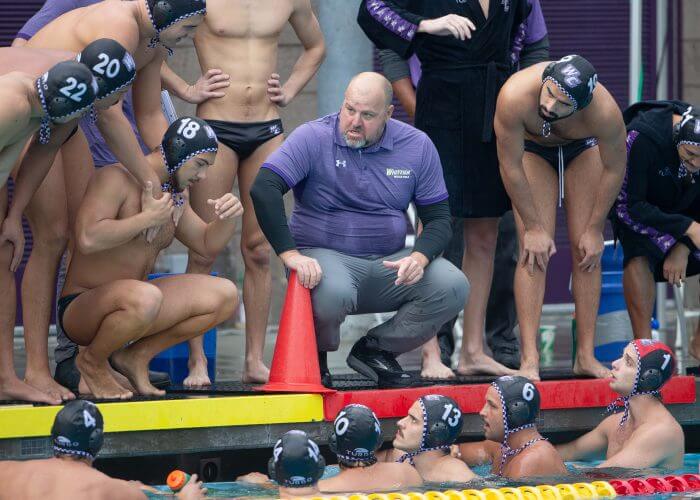
Coach Kasa and his team. Photo Courtesy: Tony Leon
The defensive pressure in this game, and the brilliant performances by both goalies —CMS’s Noah Smith had 13 saves — meant that this final was a struggle of unprecedented proportion. Which is why the Poet’s otherwise meager lead held up. Whittier’s Kasa said that, given the struggle, a two-goal lead felt “more like six.”
“Once we had that back-and-forth for a long time, everyone was toast and their legs were gone and both goalkeepers had great games,” he said. “I never was worried because a goal in that game felt like three. [Goals] were so hard to come by.”
Kasa’s CMS counterpart echoed the sentiment that the one-sided nature of the struggle wore on his players and ultimately undermined their chances to recover.
“As we went through that third quarter we generated multiple six on five opportunities and just couldn’t handle the ball,” Coach Lonzo said, then added: “You’ve got to convert those big opportunities — when you get those six-on-fives and get really good looks at the cage. We just weren’t able to put them in the back of the net.”
He did have high praise for a new tournament format that produced a great deal of excitement and interest for varsity polo program on both coasts.
“This tournament has been five – six years in the works, with countless number of discussions between coaches, admins, USA Water Polo, conference commissioners,” Lonzo said. “To see it come to fruition and to see it come in this setting was phenomenal.”



